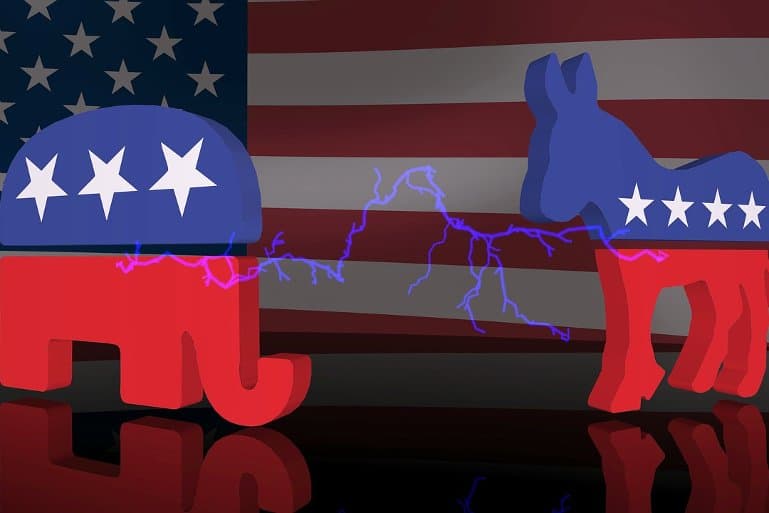Summary: Researchers investigate why people tend to dislike others based on their political affiliations and why we believe our emotions when it comes to politics are never wrong.
Source: The Conversation
U.S. Rep. Marjorie Taylor Greene drew raised eyebrows when she suggested on Presidents Day that the United States pursue a “national divorce.”
Even in an era of seemingly ever-growing political polarization – and despite Taylor Greene’s record of making controversial statements – the proposal shocked members of both political parties.
“The last thing I ever want to see in America is a civil war. Everyone I know would never want that – but it’s going that direction, and we have to do something about it,” Taylor Greene said in a follow-up interview.
“Everyone I talk to is fed up with being bullied by the left, abused by the left, and disrespected by the left.”
It seems safe to say that most left-leaning people would be puzzled by these accusations. And Taylor Greene certainly didn’t indicate that she understands the left’s perspective on causes of U.S. political conflict.
It’s intuitive that misunderstandings – like these – and hostility often go hand in hand, in both political and nonpolitical conflicts.
And yet people don’t usually think that their own emotions can be downright wrong, the way, say, their positions on a factual issue can be incorrect. Is it possible for a feeling to be a mistake?
I am a behavioral economist who studies biases in belief formation, and in my forthcoming book, “Undue Hate,” I argue that we indeed tend to excessively dislike people we disagree with – on both political and nonpolitical topics – for a variety of reasons.
When disliking another person is a mistake
Suppose Jane, a Democrat, overestimates the likelihood her Republican neighbor Joe takes bad actions or has bad opinions – by whatever Jane considers “bad.” For example, Jane might overestimate Joe’s opposition to gun control – or overestimate how much hostility Joe feels toward her.
These beliefs likely contribute to Jane’s negative feelings toward Joe. If so, since these beliefs are mistaken, then Jane would dislike Joe more than she should – by her own standards.
In fact, people in general have a tendency to make this mistake when disagreeing with others for many reasons. I call this tendency “affective polarization bias,” since it’s a bias toward excessive affective polarization. (“Affective polarization” is the technical term for emotionally hostile polarization.)
To look for evidence of this bias, I review studies of the accuracy of people’s beliefs about opinions held by members of the other political party. I also examine the accuracy of beliefs about the selfishness of choices by people in the other party in experiments with monetary stakes.
My research shows that people are indeed consistently too pessimistic about their partisan counterparts. On both sides, people tend to overestimate the other side’s extremism, hostility, interest in political violence and selfishness. And the most affectively polarized people make the biggest mistakes.
Explanations
Although “affective polarization bias” is a new term, the concept of undue dislike is intuitive for most people.
The media environment – specifically the proliferation of cable and online news as well as social media – is a common explanation for recent growth in political hostility, and has likely also led to growth in undue dislike.
Citizens are exposed to more polarizing information today than in decades past – not just on cable TV, online, and on social media, but also in person as our social networks offline are particularly ideologically segregated, more so than ever. As a result, people spend more time talking to others who are like-minded about politics, in addition to getting more like-minded news.
Although people don’t believe everything they hear, they do err toward credulity, especially when encountering information they wish to believe is true – like information about the opposition party’s character flaws, since this supports the superiority of our own party.
In the U.S., strengthened partisan identity has been on the rise because of the merging of partisan identities with other identities – like someone’s cultural or ethnic background. This has also increased people’s motivation to hold beliefs demonizing the opposition.

What’s more, there are several other important causes of undue dislike toward our rivals stemming from fundamental cognitive errors.
Overconfidence and naive realism – thinking our tastes are objective truths – make us overestimate the chance that those who disagree with us on just about anything are doing something wrong. As a result we overestimate the other side’s poor judgment and bad motives.
“False consensus” can make us overestimate how much others actually agree with us. This in turn makes us too skeptical of the sincerity of people who express different viewpoints.
Last and not least, strategic retaliation in conjunction with our biases, limited memories and limited foresight is a recipe for escalating undue hostility.
Correcting mistakes
The good news is that mistakes can be corrected. We can undo hate. More and more research efforts are underway to better understand these mistakes – and to correct them, with impressive success.
Many different nonprofit groups are also working to bring political opponents together and to correct misconceptions about the other side. Other scholars and organizations are working to make social media less polarizing.
But as infeasible as it might seem, America may need a bipartisan, top-down effort to have a shot at significantly decreasing unwarranted hatred in the short run.
In the meantime, the next time you feel hate – remind yourself it’s probably partly undue.
About this psychology and politics research news
Author: Daniel F. Stone
Source: The Conversation
Contact: Daniel F. Stone – The Conversation
Image: The image is in the public domain







